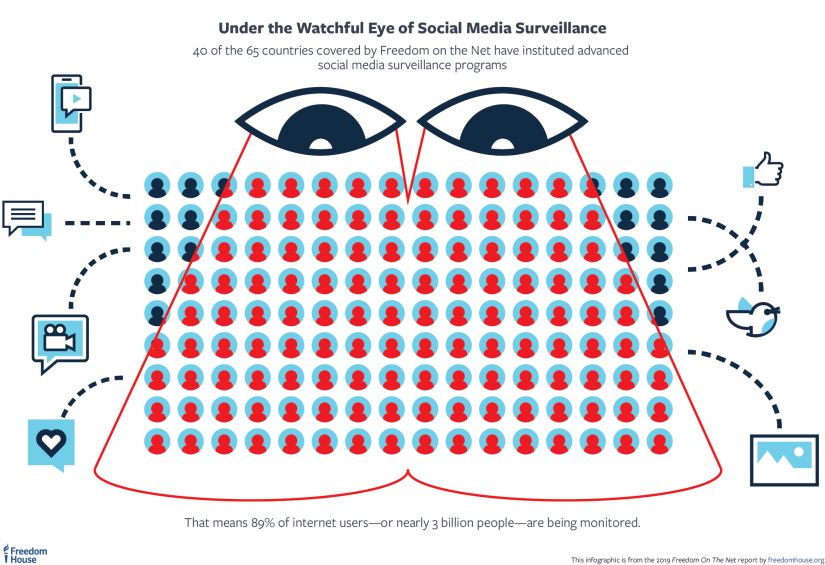 More and more governments are using social media to manipulate elections and monitor their citizens, warns a new report.
More and more governments are using social media to manipulate elections and monitor their citizens, warns a new report.
Titled “Freedom on the Net”, the report paints a dire picture where nearly half of the world’s users suffered an overall decline in internet freedom and many governments were found to be increasingly investing in social media surveillance technologies to curb internet freedom.
The report published by Freedom House, a US-based independent group that tracks free speech online, is based on an assessment of 65 countries that account for 87 percent of internet users worldwide.
Of the 65 countries, in a record 47 countries, law enforcement arrested people for posting political, social, or religious speech online; 40 countries featured advanced social media surveillance programs; and in 38 countries, political leaders employed individuals to shape online opinions, which was also a record high.
“Many governments are finding that on social media, propaganda works better than censorship,” said Mike Abramowitz, president of Freedom House.
“Authoritarians and populists around the globe are exploiting both human nature and computer algorithms to conquer the ballot box, running roughshod over rules designed to ensure free and fair elections,” he added.
While Bangladesh continues to be a “partly free” internet country, it has been listed as one of the five countries where the biggest score declines took place. The other four are Sudan, Kazakhstan, Brazil and Zimbabwe.
Bangladesh has a score of 44 out of 100 while India, also on the list of “partly free”, has a score of 55.
Pakistan has been listed as a “Not free” country and has a score of 26. China has been listed as the “world’s worst abuser of internet freedom” for the fourth consecutive year.
The report points out that Internet freedom has declined in the United States too.
US law enforcement and immigration agencies increasingly monitored social media and conducted warrantless searches of travelers’ electronic devices, with little oversight or transparency, it says.
The report says constraints on internet freedom in Bangladesh tightened during the coverage period of June 2018 to May 2019.
“Authorities blocked critical websites, circumscribed mobile networks and announced new surveillance programs,” says the report.
“Pressure on online journalists and activists peaked around mass protests calling for improved road safety and other reforms, as well as the 2018 general elections,” it adds.
The report says the Bangladesh government has invested in sophisticated technology to monitor in real time what it considers to be rumour and propaganda.
“Once reserved for the world’s most powerful intelligence agencies, big-data spying tools are making their way around the world,” said Adrian Shahbaz, Freedom House’s research director for technology and democracy.
Calling it a new menace to democracy from within, the report says populist leaders and their armies of online supporters are using this tool to distort domestic politics.
“Disinformation was the most commonly used tactic,” it says.
 Tech
Tech
30867 hour(s) 41 minute(s) ago ;
Evening 10:36 ; Wednesday ; Apr 24, 2024
Internet freedom declines globally, Bangladesh listed as 'partly free'
Send
Brajesh Upadhyay, Washington
Published : 23:31, Nov 06, 2019 | Updated : 23:33, Nov 06, 2019
Published : 23:31, Nov 06, 2019 | Updated : 23:33, Nov 06, 2019
0 ...0 ...
/hb/
Topics: Top Stories
- KOICA donates medical supplies to BSMMU
- 5 more flights to take back British nationals to London
- Covid19: Rajarbagh, Mohammadpur worst affected
- Momen joins UN solidarity song over COVID-19 combat
- Covid-19: OIC to hold special meeting
- WFP begins food distribution in Cox’s Bazar
- WFP begins food distribution in Cox’s Bazar
- 290 return home to Australia
- Third charter flight for US citizens to return home
- Dhaka proposes to postpone D8 Summit
Unauthorized use of news, image, information, etc published by Bangla Tribune is punishable by copyright law. Appropriate legal steps will be taken by the management against any person or body that infringes those laws.
Bangla Tribune is one of the most revered online newspapers in Bangladesh, due to its reputation of neutral coverage and incisive analysis.
F R Tower, 8/C Panthapath, Shukrabad, Dhaka-1207 | Phone: 58151324; 58151326, Fax: 58151329 | Mob: 01730794527, 01730794528






